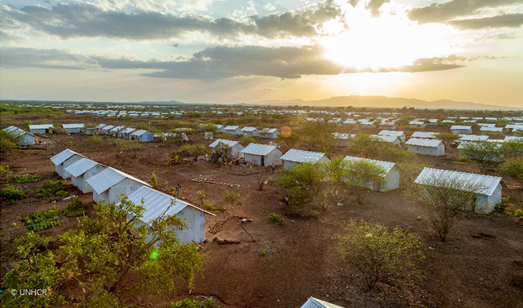Navigating Environmental Challenges in Africa
Africa faces a complex array of environmental challenges, ranging from waste management inefficiencies to the impact of conflicts and humanitarian crises on ecosystems.
In this interview, one of our Ethics Advisory Board Members, Roselyne Omondi, provides an insightful analysis of the environmental issues affecting Kenya, and other parts of Africa. She discusses the factors contributing to ineffective waste management, the role of community engagement in sustainable solutions, and the ethical considerations of bio-based waste management initiatives. Additionally, she highlights how conflicts and prolonged humanitarian crises further strain fragile ecosystems.
By examining both the challenges and opportunities, this conversation sheds light on the importance of ethical, community-driven, and sustainable approaches to addressing Africa’s environmental concerns.
To learn more about the challenges on the one hand and the opportunities on the other, we’ve posed the following series of questions to Roselyne.
What are the primary environmental challenges you observe in Kenya and/or Africa, particularly concerning waste management?

Kenya is one of the few countries in the continent that has outlawed the sale and use of single-use polythene bags to reduce the attendant environmental pollution risks and encourages the use of natural, biodegradable packaging that can be reused or recycled. The country also has robust environmental protection laws, and world-renowned environmental champions such as the now-deceased 2004 Nobel Peace Prize Laureate and Green Belt Movement Founder, Prof. Wangari Maathai, and United Nations Environment Programme 2020 Young Champion of the Earth and material engineer, Nzambi Matee . However, four main factors hand Kenya her mixed environmental outlook.
First, the country struggles with enforcing environmental laws. Many citizens and residents violate the laws without fear of reprisals. Some citizens and residents seem to lack full appreciation of the consequences of careless waste disposal. The mentality that motivates individuals’ assignment of waste disposal and collection to estate garbage collectors, city council and county authorities, rather than taking responsibility for maintaining a clean environment too, is prevalent. Environmentally unfriendly attitudes towards waste management persist in some communities. It is not uncommon for individuals in some communities to dump their household, farm, or factory waste carelessly, creating unauthorised dump sites; polluting the natural environment (soil, water, and air); and threatening biodiversity. In some cases, local and country authorities do not provide the appropriate waste disposal bins or designated waste disposal sites.
Secondly, waste management is classist. More affluent areas are cleaner with higher quality air, streams and rivers that flow freely, and greater wildlife variety. The opposite is true in less affluent areas, such as informal settlements, where solid waste clogs water bodies, and streams, and household waste litters perimeter fences, gutters, and walkways.
Next, Kenya is deficient in the political will that energises regular, community-oriented environmental drives and maintenance of clean spaces such as those that define other African countries such as Rwanda, and Morocco.
Lastly, there are several best practice environmental initiatives at grassroots and county levels. However, these are not coordinated and supported meaningfully; the net effect of the same on improving waste management in the country is limited.
How do conflicts and humanitarian crises exacerbate environmental issues in Kenya, and other parts of Africa?
Lakes regions. That said, the country faces two main challenges in relation to conflict and humanitarian crises.
First, Kenya’s Dadaab and Kakuma refugee camps are the second and third-largest refugee camps in the world. The camps, which are in ecologically fragile arid and semi-arid regions that are prone to flooding and drought, host thousands of refugees and asylum seekers for extended periods. Most of them are from Somalia, Sudan, and South Sudan. There are refugees from Democratic Republic of Congo, Ethiopia, Uganda, and Burundi too. Protracted conflicts and humanitarian crises shift focus from environmental conservation to human safety and survival, and as a result, this can contribute to the destruction of biodiversity (forests, rivers, soils) and the unfettered dumping of household and humanitarian waste.
The second factor is the military activities associated with the presence of military training grounds (in parts of the country such as Nanyuki) and containment of banditry in the north Rift. Troops have set temporary camps and riddled the surrounding lands with bullets and spent cartridges. Banditry occasionally displaces tens of individuals in Baringo and Elgeyo-Marakwet, for example, to surrounding areas where survival trumps environmental protection.

From your perspective, what are the critical factors that determine the success or failure of waste management solutions in conflict-affected or humanitarian settings?
Ignorance (lack of sensitization); suspicion, and mistrust; no or limited local community engagement and participation; and mentality of residents in the locality of interventions precipitate failure of waste management solutions. This is particularly the case when locals perceive such initiatives to be motivated by foreign interests, rather than genuine concern for locals’ welfare and wellbeing.
How important is community engagement and local ownership in the implementation of sustainable waste management solutions?
Active, continuous, meaningful engagement and participation of communities that reside in areas where new waste management solutions are implemented are crucial cornerstones that sustain such initiatives long–term. However, without genuine, sustained interest in the welfare and wellbeing of these communities, ‘community engagement’ and ‘local ownership’ become empty, token, meaningless buzzwords.
What are the ethical considerations and potential pitfalls that need to be addressed when introducing bio-based solutions in humanitarian contexts?
There are several. However, ‘do no harm’ stands out as a strong, critical, overarching motivator of and guide to all activities undertaken in the implementation of such initiatives and related outcomes immediately, mid-term, and long–term.
What are the potential social and economic impacts of successful bio-based waste management solutions on local communities?
Forcibly displaced persons in protracted humanitarian situations struggle with, among other challenges, loss of livelihoods and self-reliance, and depend on good will of others such as local social protection and security support officers, and humanitarian aid workers. Prolonged dependence on others lowers dignity and self-worth.
Bio-based waste management solutions could inform and/or further innovations to address the same challenge at scale or similar challenges. This will create opportunities to gainfully support such innovation directly or indirectly in the bio-waste management value chain. Some of the individuals involved will acquire new identities, enhancing their self-worth.
What are the key challenges and opportunities for replicating successful bio-based waste management solutions across different humanitarian settings in Africa?
Mistrust about the real motivations of the implementors and extent to which the said solution is perceived to be a genuine attempt to improve the welfare and wellbeing of the whole community in the locality of implementation, as opposed to financial or other gain for a handful of individuals, is one of the key challenges. The opposite holds; trust and transparency bolster such efforts, allowing implementors and local communities to innovate and scale community-oriented innovations that the target community cares for and about.

Roselyne Omondi is one of the Ethics Advisory Board Members for the Bio4Human project. She is an experienced writer-researcher-analyst, journalist, humanitarian worker, and armed conflict expert, whose work relates to protracted armed conflict, forced displacement, migration, humanitarian disasters, climate change, violent extremism, international development, community engagement, (crisis) communication, foreign relations, sustainable development goals, and the environment. She also writes human interest articles on a range of topics. These include, inter alia: refugees, food security, technology, innovation, and travel. An author of two books (both in 2024), she has written numerous weblogs, research papers, journal articles, policy briefs and reports, among others. She has also overseen the production of numerous publications, including: several book volumes, studies, monologues, and anthologies. Her work has been featured in print and online, in academic, and literary journals, regional newspapers, international magazines, newsletters, media outlets, and websites and reports of several organizations, including think tanks, international educational institutions, research institutes, intergovernmental organizations, universities, and humanitarian organizations.
Email: r.omondi@outlook.com
